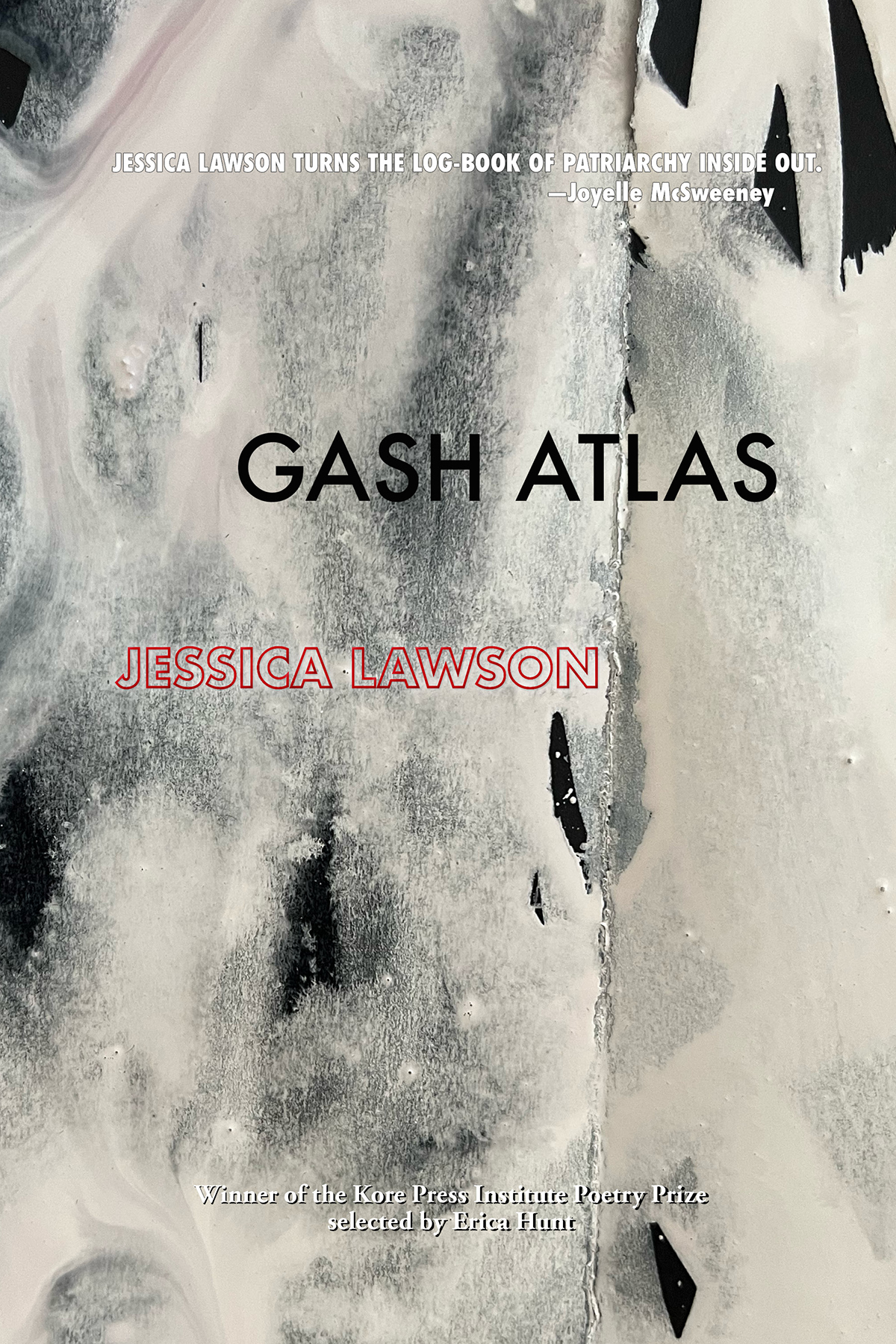
Poet Jessica Lawson started out writing what she thought would be a book of poems themed around maps.
“Shortly into the writing process, Donald Trump was elected, and everything turned upside down,” says the author of the new poetry collection Gash Atlas. “The themes I was already thinking about — territories, visibility, erasure — were reintroducing themselves to me through that event and the events that followed.”
Instead, Lawson, who received her MFA from the University of Colorado Boulder and teaches there, wrote about “the power that is practiced in naming a territory (and by extension, naming a feeling, naming a person), and the histories of violence and colonialism that inform that naming.”
The resulting book, Lawson’s first full-length poetry collection, won first place in the 2022 Kore Press Institute Poetry Prize. Released Sept. 15, Gash Atlas is at once profane, erotic, subversive and brutally honest to the point of hilarity.
“My best hope is that a poem might break something open, leaving just enough new space so that, perhaps much later, in concert with other experiences and growth, a change of mind or a motivation to act might emerge,” Lawson says.
With this space for action in mind, Lawson doesn’t shy away from getting political in her work. Some poems in the collection respond to the news over the last few years, like the U.S. opposition to the United Nations resolution banning the death penalty for homosexuality in 2017, or the murders of four Black trans women within a single week that same year. Others explore topics like the Standing Rock uprising, sanctuary cities and police brutality.
Like all good poetry, the individual lines are most effective read aloud — and when you attempt to parse them, the meaning becomes slippery.
Take, for example, this line from “Compass: An Opening”: “When he calls me ‘sheath’ he offers to pay / for my parking ticket if I nominate him / for president.”
Putting such lines under a microscope diminishes their power. But in the context of the book, line after line of these surprising, inventive poems leads to a whole greater than the sum of its parts.

‘Seen, charted, pinned’
With Lawson’s blend of terror and dark comedy, it’s easy to imagine hearing these poems read in-person would be a riot — the room alive, uncomfortable and laughing as the sense of doom sets in.
Lawson says she experienced that feeling of dread in the responses of “supposed allies” during the Trump presidency.
“I saw plenty of folks offering shallow comforts, saying (always from a safe distance) that Trump’s rhetoric was just rhetoric and that people of color, queer and trans folk, immigrants, and other vulnerable groups would probably be just fine,” she says.
Just as frightening to Lawson were those surprised by Trump’s 2016 victory and what it represented.
“As if there weren’t hundreds of years of white supremacism and other violences undergirding that moment,” she says. “In writing about that moment, I needed to make a dual insistence that these violences: 1.) were here, and 2.) had always been.”
That focus on the roots of violent white supremacy carries through Gash Atlas with Lawson’s skewering of the myth of Christopher Columbus.
“Early in the writing process, I started developing the character of an antagonist, someone who brought with them an overarching connection to colonialism, sexual violence, white supremacism and more,” Lawson says. “Since I was already writing about maps, I began to think of Columbus as a figure so often misrepresented as a hero of an age of exploration.”
Lawson makes the Italian explorer absurd, morphing him into proxies for other terrible men such as Trump, Richard Nixon, a horrible boss, a customs agent and a university professor.
“Columbus, in this book, is an amalgamation of multiple institutions and personalities, both past and present,” Lawson says. “Giving him Trump’s words was a way of naming the cultural moment in which I was writing, but interweaving those words with others was just as important.”
To that end, the poems in Gash Atlas are grouped in a way to give the reader a sense of structure — a map, if you will — that is both familiar and chaotic at the same time.
“Their effect is intentionally disorienting,” Lawson says. “I wanted maps to feel inescapable, as if we can’t move through the book without being seen, charted, pinned to a location.”
Lawson wrote most of the book while her second child was a baby, which meant she had limited time to put down the words before her child’s nap ended. That process forced her to not second guess what she needed to say and to trust herself to edit it later.
“It made the poems go darker, faster, when writing in these incredibly compressed increments of time,” she says.
As for the future, Lawson recently gave birth to her third child and will be publishing a short piece about that.
“Beyond that, I’ve been writing about money, sexuality and trauma recovery, all aimed at a second book project that excites and terrifies me in equal measure,” she says. “I suppose that’s par for the course. I was scared of Gash Atlas the entire time I was writing it. The act of writing something that isn’t Gash Atlas is almost scarier.
Five books recommended by Jessica Lawson:
Trimmings (1991)by Harryette Mullen: “Reading this book when I was in my doctoral program is part of what drew me back to poetry after a long absence. Mullen uses tight, brilliant verbal pivots to pick apart race, womanhood and the history of the arts.”
Buck Studies (2016) by Douglas Kearney: “I love Kearney’s visual style across so much of his work, and here it’s paired with a really particular study of voice and character that I keep returning to.”
Mommy Must Be A Fountain of Feathers (2008) by Kim Hyesoon: “I’ve always been drawn to writing that examines the body, often in unsettling or grotesque ways. Kim provided a model of how to do this that is surprising, subversive and playful.”
Electric Arches (2017) by Eve L. Ewing: “This book is so rich and complex and conceptually complete, I find something new every time I open it. It’s also a great model of work that incorporates a multimedia approach in unexpected ways.”
Mannish Tongues(2017) by jayy dodd: “I love teaching this book so much, and it rewards careful attention to its references to larger literary history and form, all while told in a voice that is intimate and immediate. I have a few former students who have gone on to find dodd’s other work after encountering her first book, which is one of my favorite things to witness.”














